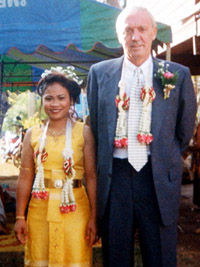Kidnapping and murder of Kenneth Bigley
Kenneth Bigley was a British civil engineer who was kidnapped and subsequently murdered in Iraq in 2004. His abduction and the events that followed garnered significant media attention and led to international calls for his release.
Background[edit | edit source]
Kenneth Bigley was born on April 22, 1942, in Liverpool, England. He worked as a civil engineer and was involved in various construction projects around the world. In 2004, Bigley was working in Iraq, a country then under intense turmoil following the 2003 invasion by a coalition led by the United States.
Kidnapping[edit | edit source]
On September 16, 2004, Kenneth Bigley was kidnapped in Baghdad along with two American colleagues, Jack Hensley and Eugene Armstrong, by an insurgent group led by Abu Musab al-Zarqawi, which was affiliated with Al-Qaeda. The group demanded the release of female Iraqi prisoners in exchange for the hostages.
Media Campaign[edit | edit source]
Following his abduction, Bigley's family launched a media campaign to secure his release. They made several appeals to the kidnappers through various media outlets. The British government also engaged in diplomatic efforts to secure Bigley's release, but these were ultimately unsuccessful.
Murder[edit | edit source]
Tragically, on October 7, 2004, a video was released by the kidnappers showing the beheading of Kenneth Bigley. His death was met with widespread condemnation from the international community. The murders of Hensley and Armstrong had been carried out and publicized in the days preceding Bigley's death.
Aftermath[edit | edit source]
The kidnapping and murder of Kenneth Bigley raised questions about the safety of foreign workers in Iraq and the effectiveness of the coalition's strategy in the country. It also highlighted the brutal tactics used by insurgent groups in Iraq to further their objectives.
The British government faced criticism for its handling of the situation, though it maintained that it did everything possible to secure Bigley's release. The incident also led to increased security measures for foreign workers in Iraq.
Legacy[edit | edit source]
Kenneth Bigley's death had a profound impact on public opinion in the United Kingdom and around the world. It brought attention to the dangers faced by civilians in conflict zones and the human cost of the Iraq War. Memorials were held in Bigley's honor, and his family established a foundation to support victims of conflict.
Search WikiMD
Ad.Tired of being Overweight? Try W8MD's physician weight loss program.
Semaglutide (Ozempic / Wegovy and Tirzepatide (Mounjaro / Zepbound) available.
Advertise on WikiMD
|
WikiMD's Wellness Encyclopedia |
| Let Food Be Thy Medicine Medicine Thy Food - Hippocrates |
Translate this page: - East Asian
中文,
日本,
한국어,
South Asian
हिन्दी,
தமிழ்,
తెలుగు,
Urdu,
ಕನ್ನಡ,
Southeast Asian
Indonesian,
Vietnamese,
Thai,
မြန်မာဘာသာ,
বাংলা
European
español,
Deutsch,
français,
Greek,
português do Brasil,
polski,
română,
русский,
Nederlands,
norsk,
svenska,
suomi,
Italian
Middle Eastern & African
عربى,
Turkish,
Persian,
Hebrew,
Afrikaans,
isiZulu,
Kiswahili,
Other
Bulgarian,
Hungarian,
Czech,
Swedish,
മലയാളം,
मराठी,
ਪੰਜਾਬੀ,
ગુજરાતી,
Portuguese,
Ukrainian
Medical Disclaimer: WikiMD is not a substitute for professional medical advice. The information on WikiMD is provided as an information resource only, may be incorrect, outdated or misleading, and is not to be used or relied on for any diagnostic or treatment purposes. Please consult your health care provider before making any healthcare decisions or for guidance about a specific medical condition. WikiMD expressly disclaims responsibility, and shall have no liability, for any damages, loss, injury, or liability whatsoever suffered as a result of your reliance on the information contained in this site. By visiting this site you agree to the foregoing terms and conditions, which may from time to time be changed or supplemented by WikiMD. If you do not agree to the foregoing terms and conditions, you should not enter or use this site. See full disclaimer.
Credits:Most images are courtesy of Wikimedia commons, and templates Wikipedia, licensed under CC BY SA or similar.
Contributors: Prab R. Tumpati, MD

